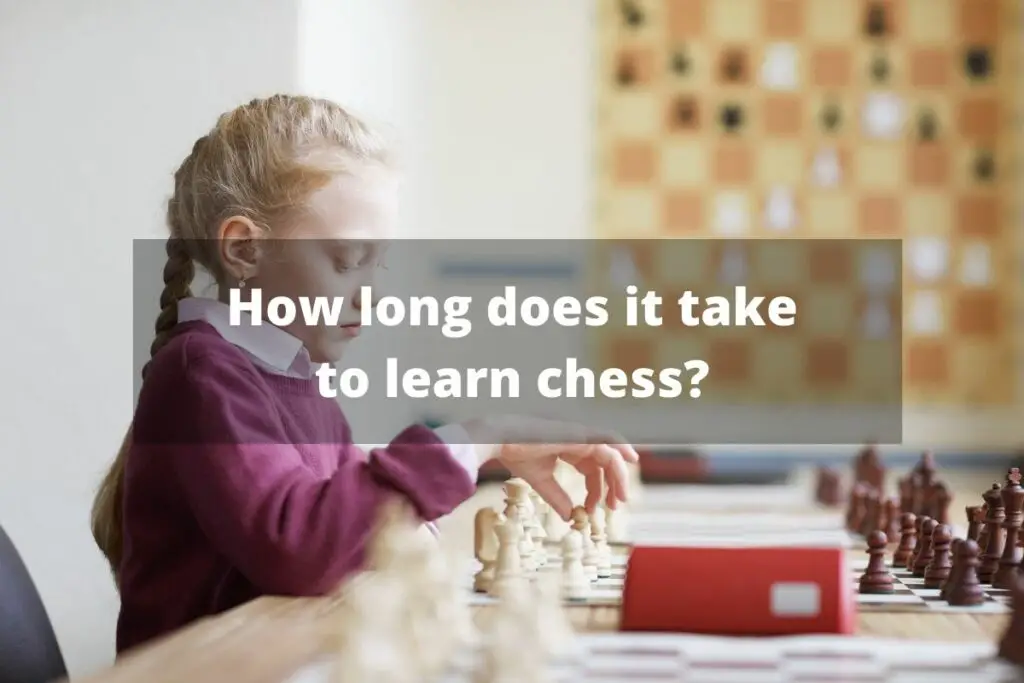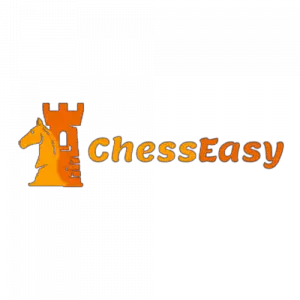Chess is a game of logical thinking and smart acquisition of selecting positions. So, if you want to learn chess then you must stay alert and active to learn tactics and recognize patterns. Now, you must be wondering how long it takes to learn chess. So, let us find an answer to it.
Typically, it takes 1-2 years of daily practice to learn the chess game and become a good chess player. You can build a good foundation within this time frame. However, it depends on the player how much time he wants to dedicate daily to learning chess tactics.

Learning chess does not involve selecting moves or positions. It also requires tactics to learn how the opponent player is going to select his moves and positions. So, to master these techniques, you have to develop your cognitive and intuitive skills and keep yourself active and alert with regular practice. It might take a long time or less than that to master the chess techniques. However, it depends on your dedication to learning chess and the time you devote every day to undergoing active training sessions.
In this article, you will get answers to all your queries and also find a few effective ways to increase your chess-playing skills. So, keep reading!
Learning chess technically and training the game at the same time can help you become a good chess player
The key to improving your game is to learn and train yourself to get aware of the new ideas and techniques.
However, you have to keep a balance between your training and the implementation of technical knowledge. If you devote time to gaining experience for years then you can only improve the skills of sitting for a long hour while playing a chess game. This will in no way make you a good chess player. You will only invest a lot of time in training rather than focussing on learning the technical skills of a chess game.
In simple terms, you will only develop theoretical knowledge instead of developing technical abilities. So, try to learn the technical knowledge such as finals, openings, strategy, and manoeuvres, which will reflect in your game.
How to learn chess to become an advanced chess player?
When you have decided to become a chess player and achieve excellence in the game, you need to set a goal so that you can develop from a beginner to an advanced player. Instances are there when players fail because they have not set a goal.
So, at first, you set a goal and then start working on it. If you do not set your destination then you will not be able to go there. So, this rule applies to the chess game. Set a goal and try to reach that level. Players must learn from the names of chess pieces to get to the level of solving and understanding complex positions and tactics.
If you are at the beginner level, then set a goal to reach the intermediate level. Then, you can reach the advanced level of chess, which is 2100 or more.
Set a goal that is measurable and realistic. As a beginner, you can set a goal to reach an advanced level. So, set specific goals and work on them until you reach there.
Focus on how you are ending the game and try to end it correctly. So, you need to be patient and keep practising daily to learn new strategies and tactics. You can solve chess puzzles online to develop your skills. This will help you recognize the patterns, set positions, and decide on the moves.
Devote 1-2 hours daily and keep practising for 1-2 years so that you will be confident about your plans and cognitive skills. Try to work hard and stay focussed on your goals. The intensity of your dedication and patience will decide how good a chess player you can become.
Teach yourself To Play Chess
- Set up the chess board properly.
- You need to learn who makes the first move and how to deal with it.
- Learn how to put a twist on some basic rules or special rules.
- While moving the pieces, first, you need to know how to move them tactfully.
- Learn the basic chess strategies to stay updated.
- And last but not least; practice is the key to success. Devote time and try to play chess regularly so that you stay updated and your brain remains active and alert always to recognize the plans and tactics that the opponent plays.
Learning chess for different age groups:
We have taken three age groups; under 10, 11-12 years, and 18 years and above to understand what they can learn and the benefits of learning chess for them. Also, we will discuss the drawbacks of playing chess games for different age groups.
Age group (under 10 years)
Children under the age of 10 years do not have much study pressure. Hence, they get a lot of time to play with their friends, parents, and online video game, etc. so, they can devote time to learning chess if they have an interest in playing chess and can become professionals in chess in 1.5-2.5 years. They can learn the basics of chess such as the moving of pieces, castling, and how to promote a pawn. Remember, this process might not be available for a child above age 18. So, their learning might get slow in the process.
Playing chess at such a young age can make their brain sharp and keep them active and smart. So, to improve their productivity in studies, young children can play chess in their leisure time.
However, a young child below 10 years cannot develop a great thinking process or cannot develop a scientific strategy to play chess effectively. This age group can play chess well, but, they might lack reasoning while playing chess at this age.
From 11-15 years
An 11-15-year-old child can develop serious skills of understanding abstract concepts, scientific-logical reasoning, and remarkable ability to calculate, etc. So they will find it exciting to learn chess at this age. Children between age 11 to 15 generally requires 2-3 years to become professional chess players
This will help increase their cognitive thinking and reasoning power. Their mind will be sharp and active if they practice chess regularly.
However, they have to devote time to learning chess and play regularly so that they do not feel idle, which might be one of the consequences if one plays chess and takes a break for a month or two. So, if they are having study pressure and want to take a break from the game of chess then they might feel idle and inactive while solving problems or chess puzzles.
18 years or above
In general, people 18 years and above requires 3-4 years to become strong chess players. Because this age category people will be involved in multiple works and studies, hence the time they can spend will be much less.
If you are fully involved in chess then in a couple of years you can excel in the game of chess.
An 18-year-old should develop his chess-playing skills and plan the tactics. He should also develop certain concepts and logical reasoning to perform well in the chess game.
This will help them learn the critical chess tactics and develop strategies while playing a high-level game. However, they have to give full attention to the game and engage themselves with regular practice; failing which they will lack skills and reasoning ability as well.
Tips to improve at chess quickly
- To improve your chess skills, you need to practice daily with active training sessions. If you want to find out why professional chess players make great moves then you should understand that they do active training sessions daily to keep themselves alert and active. This also makes their brain sharp so that they can think about new ideas and new tactics.
You have to be the one who makes an effort by exercising your calculation skills, your spatial vision, and your general mental agility. - You need to practice for a particular time period so that you can dedicate the same time every day. This will increase your dedication and make you attentive to your chess moves. So, stay consistent with the time you spend daily or weekly practicing chess. This will increase your level and make you more confident with your moves and plans.
- When you take active training sessions, you should include a few important things in it such as calculating variants, resolving tactical positions, and completing strategic exercises. This will develop your skills in the long run and make you an active chess player.
To wrap it up
You will need to develop a lot of skills and learn extraordinary tactics and techniques to learn chess fast and become a good chess player. If you give your best and stay dedicated then this will increase your skills to set new and improved game strategies. Set a timeframe to do active sessions and solve chess puzzles regularly so that you will not get idle and lose interest in the game.
